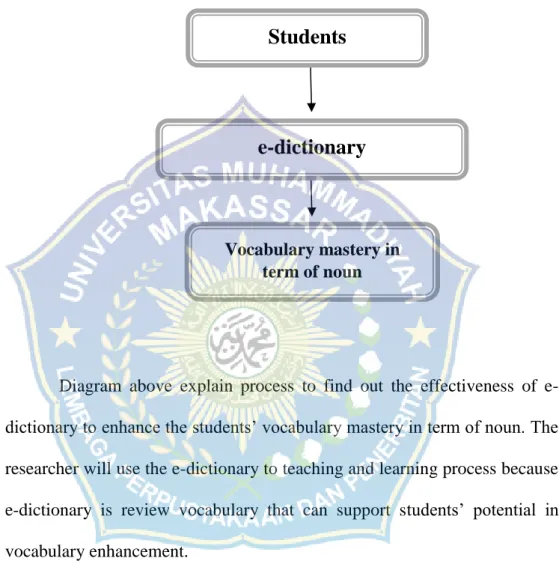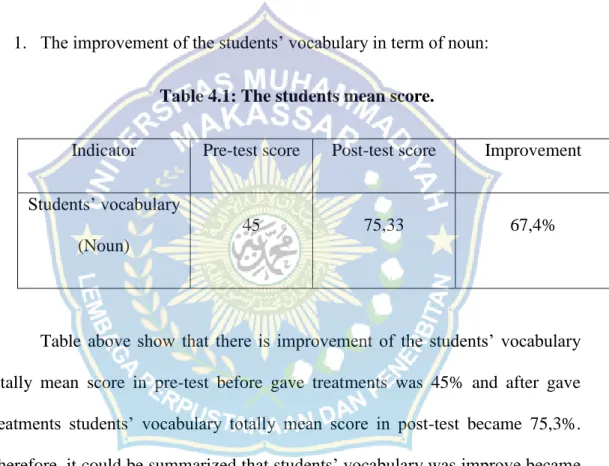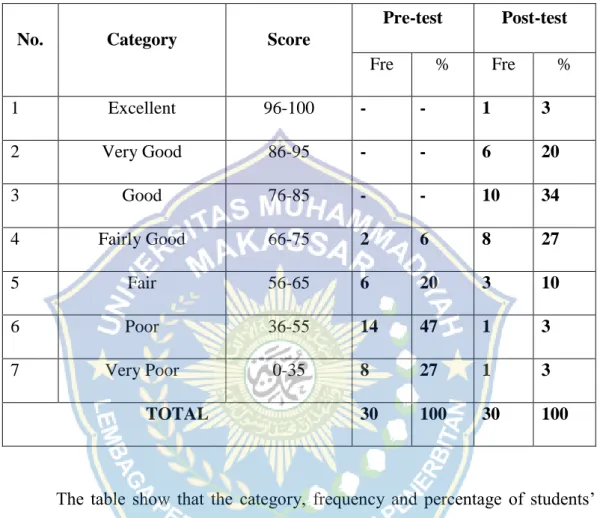The purpose of this thesis is to determine whether an e-dictionary is effective in improving the vocabulary mastery of grade VII A students of SMP Negeri 3 Bajeng. The population of this research is Grade VII students of SMP Negeri 3 Bajeng and the researcher used cluster random sampling to draw the sample. The hypothesis of this research can be concluded that the null hypothesis (H0) is rejected and the alternative hypothesis (H1) is accepted.
Glory and gratitude to Almighty God who has given abundant grace and health to enable the author to complete this thesis entitled “Using e-dictionary as a medium to enhance the vocabulary of students.” as one of the requirements. to complete the undergraduate program (S1) majoring in English. Baharu, S. Pd., as the principal of SMP Negeri 3 Bajeng, who replaced the researcher who conducted this research at the school. Many thanks to all the Grade VII A students of SMP Negeri 3 Bajeng who helped the researchers to conduct this research.
The content is in the form of an unlimited amount of vocabulary and can be adapted to the students' needs. According to the above reason, the researcher was interested in conducting a study under the title "The Used of E-Dictionary as A Media To Enhance the Students' Vocabulary".
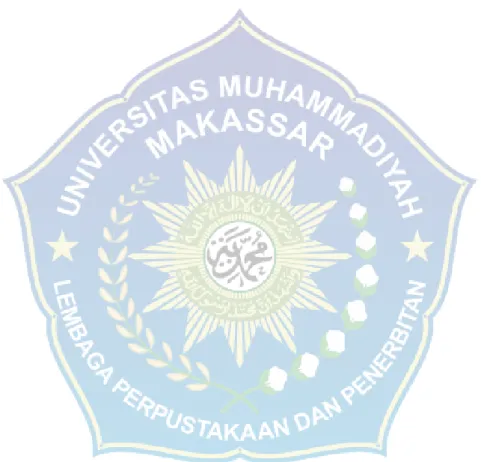
Problem Statement
This electronic dictionary can be accessed via a mobile phone or laptop, making it easy to carry anywhere (portable). Therefore, this presented study attempts to fill the gap through research that examines the use of an electronic dictionary.
Research Objectives
Significance of The Research
Scope of The Study
The first from Park (2006) The results of this study are particular training sessions on how to use an electronic dictionary, which resulted in significant differences across users of the dictionary. Those who had been given instructions showed more positive attitudes towards the usefulness of the electronic dictionary. The study believes that good guidance on the use of electronic dictionaries and their benefits should have a profitable impact on users based on the above findings.
Another from Fageeh (2014) entitled This study was designed to use an online dictionary to examine the effect of presenting a vocabulary analysis of a new vocabulary of related words to students in an online environment. The results are explained in relation to the hypothesis in light of the research background presented in the literature review. Xie (2019) The aim of this study is to determine the effect of vocabulary richness in the text before and after using the E-dictionary, which was used based on the comparison of the E-dictionary with the Chinese-English translation.
This study found: on the one hand, the use of E-dictionary encouraged middle and lower students to write longer pieces, indicating a growth in their dedication and self-confidence. The differences in the previous research used descriptive quantitative design and another to improve students' vocabulary mastery, but all the previous research and this research focus on how effective the dictionary is in improving students' vocabulary mastery.
Some Pertinent Ideas
- Definition of E-Dictionary
- E-dictionary as a Learning Media
- Kind of E-Dictionary
- Google Translate
- Indonesian - English Dictionary
- U-Dictionary
- Advantages and disadvantages of E-Dictionary
- Vocabulary
- Teaching Vocabulary
- The Principle of Teaching Vocabulary
- Vocabulary Enhancement
- The Importance of Vocabulary Learning
In this case, the media has its own significance in the teaching and learning process. Media is a very strategic tool in the perspective of education in determining the success of the teaching and learning process. In the application you just need to type the word you want to know the translation of.
For many words that have not been found in the dictionary before, the meaning can be found on E-Dictionary. It is considered prudent for the students to use words in the situation that is appropriate. Vocabulary is one of the most important aspects of language learning, for both teachers and students.
Vocabulary is important in language learning as it helps in the development of language competence. This means that vocabulary is an early stage that must be taught before teaching other aspects of the language (Subiyati, 1992:18).
Conceptual Framework
Students
Hypothesis of The Research
H0: There was no significant improvement between the Pretest and Posttest of the students' Vocabulary improvement after using E-Dictionary. H1: There was a significant improvement between the Pre-test and Post-test of the students' Vocabulary improvement after using E-Dictionary. This study used a quantitative research method with a pre-experimental class research as the research design.
The researcher used pre-experimental class because the researcher wanted to measure the development of students' vocabulary improvement using E-Dictionary as a media. In this study, the researchers set one class as the class for given treatment, namely the first grade at SMP 3 Bajeng. The population of this researcher was the first grade students in SMPN 3 Bajeng in the academic year according to the data provided by the administration at the school, the population consists of 5 class, each class 30 students and a total of 150 students.
This research applied a random cluster sampling technique in which the first grade students of SMPN 3 Bajeng. In this research, the researcher took only one class to represent the entire population. In this study there were two variables, namely the independent variable and the dependent variable.
The indicators of this research were vocabulary improvement using the E-Dictionary and vocabulary comprehension focused on nouns.
Research Instrument
The post-test aimed to find out if students' vocabulary about nouns improved after learning in the treatment. The results of this post-test were calculated to determine whether the students' vocabulary improves or not with the help of the E-Dictionary media.
Technique of Data Collection
Technique of Data Analysis
A t-test is a type of inferential statistic used to determine whether there is a significant difference between the means of two groups that may be related in certain ways. The data obtained from the pre-test was analyzed according to the following procedure: Calculation of the average score of students' answers in the pre-test and after it according to this formula:
To calculate the improvement of the students' scores on the pre-test and post-test, the researcher used the following formula: To find out the significance between the pre-test and post-test by calculating the value of the test. After obtaining the value of the t-test, the researcher compared it with the value of the t-table to make the assumption.
If the value of the t-test is greater than the t-table, so the assumption is there is a significant difference between Pre-test and Post-test, so the use of Pre-questioning is good to apply for the accelerating find out students' vocabulary. Explain in this finding the result of the research such as students' score pre-test and post-test. The result of the pre-test before using the E-Dictionary, there were no students in category excellent, very good and good.
The result of the post-test after using the E-dictionary as media shows that there is 1 student in the category excellent, 6 students in the category very good, 10 students in the category good, 8 students in the category fairly good and 3 students in the category fair and only 1 students in the poor and very poor category.
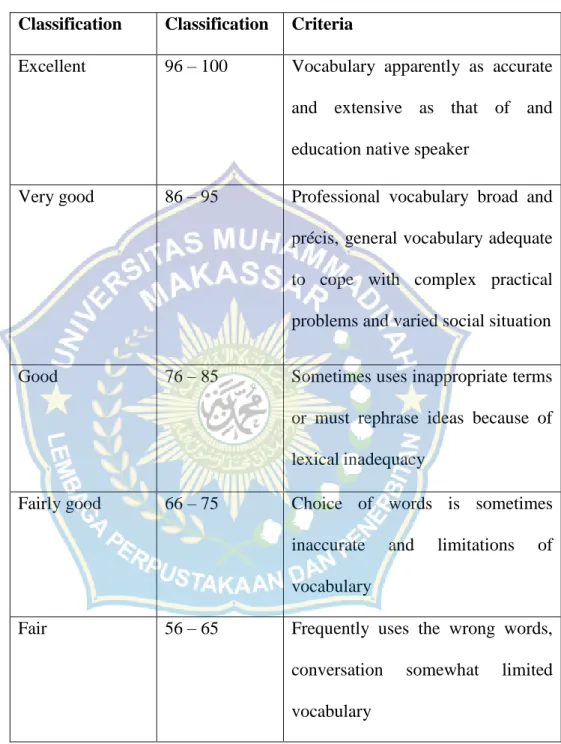
The result of The Students’ Pre-test and Post-Test
- Discussion
- Suggestion
- KOMPETENSI INTI
- KOMPETENSI DASAR
- TUJUAN PEMBELAJARAN
- Media/Alat, Bahan Dan Sumber Belajar
- MATERI PEMBELAJARAN Noun
- LANGKAH-LANGKAH PEMBELAJARAN
- PENILAIAN
This means there was an improvement in students' vocabulary mastery after using E-dictionary as a media. This means that there was a significant difference between the results of the pre-test and post-test of the students. Based on the table above, it could be concluded that the t-test value was greater than the t-table (T-Test > T-Table), so the final result shows that the t-test score for the final score of students ' vocabulary performance was (14.37>2.045).
This shows that there is a significant difference between the vocabulary of the students before and after using the E-dictionary. The table above showed that there was a big difference between the t-test and the t-table, so the researchers concluded that teaching vocabulary with the E-Dictionary was effective in improving students' vocabulary performance. In this part, the results of the research on the use of E-dictionary as a media to improve the vocabulary mastery of students in grade VII A in SMP Negeri 3 Bajeng, by referring to the research objective, explaining the process of applying of E-Dictionary to Improve Vocabulary Mastery of Group VII also describes the improvement of students' vocabulary mastery by using E-dictionary as a medium.
The previous explanation shows that the students' vocabulary mastery improved, and it was supported by the assessment of the students' means before and after the treatment using the E-dictionary. Based on the above finding, the student's vocabulary mastery significantly increases after treatment using the E-dictionary as a medium. The result of paired samples statistics showed that the average score before and after the test.
The output of paired sample statistics showed that the mean score for the pre-test was 45 and the mean score for the post-test was 75.33. The result of this research showed that the students' vocabulary in terms of nouns at seven classes of SMP Negeri 3 Bajeng in the 2021/2022 academic year could be improved, and the students' scores after using E-dictionary as a medium were better than before the treatment was given to the students . The purpose of this research was to find out whether the use of E-dictionary was effective in increasing students' vocabulary in seven grade levels in SMP Negeri 3 Bajeng in the academic year 2021/2022.
The students' average pre-test score was 45, which was classified as poor, and 75.33 after the test, which was classified as good. It showed that the average score of the students after the test was higher than before the test. Based on the results of the data analysis, the researcher concluded that the use of an e-dictionary in teaching vocabulary could increase the students' vocabulary, as the students had a comparison before and after the treatment, and before the treatment the students had weaknesses in vocabulary and after the treatment students increased their vocabulary using the E-dictionary.
Moreover, another finding in this research was that the mean score of students in pre-test was classified as poor classification and after post-test was classified as good classification. The researchers should be more creative in creating an interesting medium to teach and improve students' vocabulary.

The significant Different
